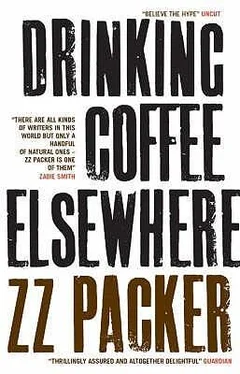The boy named Gerard flicked his palm open while his entourage clung to Dezi. They hugged his legs, yanked his arms, all the time squealing his name. Gerard’s face turned serious while the others laughed and shouted. “Gimme some money,” Gerard said, his palm still out, “the kind that folds.”
“Nuh-uh,” Dezi said. “Not today.”
The other kids all began to plead with outstretched palms, explaining why they needed money.
“My tooth hurting me and I need some candy to make the pain go away.”
“See that spot? See that spot on my arm? Doctor say that spot gone kill me. He say money make it go away, though.”
Gerard kept his face wise and smileless, his hand outstretched.
“I’ll tell,” he said to Dezi, his eyes steady. “I will tell.”
“These kids,” Dezi said, shaking his head with mock weariness. He pulled out the folded, rubber-banded wad of money from his pocket and then tugged at some bills. The kids crowded around Dezi and Tia so closely she could smell their sticky kid fragrance. Dezi began pulling off five-dollar bills, and the kids’ silence was so profound that for a moment the only sound she heard was the canned laughter from a faraway TV.

DEZI PILOTED her through a maze of walkways and into his apartment. It was the first time she’d seen a place in which a man lived by himself. The carpet was a worn, nubby beige, the color carpet she’d expected all the Stanford Gardens apartments to have, but Dezi covered his with randomly placed sheepskin rugs — one under the glass coffee table, one leading to the small kitchen, one out in the area that passed for a hallway. Everything else was black acrylic made to look like lacquer, trimmed with thin gold accents. Everything was the same shiny black, the coffee table upon which sat a thriving philodendron, the stand that held his stereo system and television, the frame of Dezi’s one print: an airbrushed night skyline that could have been any city, anywhere. The apartment was neat, the air weighted with coconut incense.
Tia could not shake the sight of that bundle of money. She’d seen it earlier that day, but now it set off alarms: it was at least twice more than what she’d seen on the collection plate at church. Once, when her aunt had fallen asleep, she’d watched a TV special called Gangland Diaries . It showed drug dealers making so much money and living so recklessly that some made up wills at the age of fifteen.
After Dezi had sat her down and gone into the bathroom to get alcohol for her wound, she stood up. He walked out carrying an alcohol-soaked cotton ball.
“Listen,” she said, “I really should go. Really.”
“No. I don’t think you should.” He took hold of her arm so that the cotton ball hovered over her scrape. “Atlanta’s a dangerous city. This’ll only sting for a second.”
She didn’t know him, and she’d gotten into his car as if it were nothing. She began to think of ways he might kill her, or more likely than not, according to the TV special, she’d become his enemy’s hostage.
He pulled her even closer to him, the smell of his cologne overpowering the rubbing alcohol. “You don’t trust me, do you?”
“I didn’t say that.”
In one quick motion, Dezi grazed the cotton ball along the scrape. She didn’t yelp until she saw him grinning at her. “That didn’t hurt,” he said.
“It did! You were supposed to tell me when you did it.”
Dezi kissed her cheek, and threw away the cotton ball as though the two actions held the same value. Though it was the first time any male had kissed her, she didn’t feel the import of this until after it was done. She had always imagined that when someone kissed her, her eyes would be closed in anticipation, she would be waiting to receive the kiss, and her beloved would be waiting to give it — waiting, of course, for the proper moment. Dezi had taken something away from her when he kissed her, but she could not name it.
He cooked two slabs of steak while she waited on the couch. It was the first time in a long while that she’d stopped moving. Sitting Indian-style, she tried to imagine herself a yogi thinking back into all her past lives. She closed her eyes, but all she saw was the orange from the blood vessels of her eyelids. Dezi brought out two plates of steak, no vegetables. It was tough, chewy, and oversalted; his cooking philosophy was to add generous shakes of every spice he had available.
“So,” Tia said, “your pockets seem pretty full. You must have a good job.”
Dezi caught the accusation in her voice and smiled. “You see any banks ’round here? Where would I put my hard-earned dough?”
“The hard-earned dough you make doing what? Dealing drugs?”
Dezi shrank back as though stung, hands flying up in the air, offended. “Why black women do us this way? Why does every man with a roll gotta be a drug dealer?”
Tia cut a piece of steak and looked at him.
“Let me ask you a question. How’d you get here?”
“Bus.”
He stopped cutting and forking the meat, utensils in his hands like crab claws. “I mean, what were your circumstances ?”
“I’m doing a genealogy project,” she said.
“You came from some country-bumpkin town by yourself to do a genealogy project?” He nodded, waiting for the real reason.
Tia hadn’t wanted to tell him, she had been doing a good job talking tough, but the words came out by the gallon. She told him about church, about Marcelle and Sister Gwendolyn. She told him about the bus ride and not being able to find a place to stay, about sleeping in the woman’s car, and getting chased. She told him about her mother, and finally asked, “Do you know a woman named Rosalyn Dunlovey?
He looked up to the ceiling and then a wave a recognition crossed his face.
“Is she, like, sort a medium height? Long hair like yours? Pretty brown eyes?”
Tia put down her fork. “Where is she?”
Dezi laughed and waved his hand. “Naw. I don’t know her.”
She began to hit him, slapping at him wherever she could, but he caught her, hugging her so that her hands would stop hitting him. She wrestled with him, inflamed that he could keep her down without much effort. “Hey. Hey. Hey,” he said. “I didn’t mean to joke like that.”
She had never hit anyone that way, but doing so made her feel closer to Dezi, as though they’d weathered some ordeal together.
He told her about Gerard. “His mama’s an addict. A real addict. She suck your dick and shit.” He looked at Tia, eyes apologizing for the language. He shook a Newport out of its package and lit it. “I give them kids money, and you know what? All them other kids buy candy and shit. They money gone”—he snapped his fingers—“just like that. Not Gerard. He take that money and get on the MARTA. He buy him some chocolate bars like schoolkids be selling and go to white neighborhoods. He puts on a little limp and gets some big TB-sounding coughs going and say he’s selling for the Leukemia Foundation. Them white folks eat it up. Homeboy buys his own clothes, shoes. Not fancy ones. Just ones that fit.”
“Sounds like he’s a good kid.”
“Hell yeah.”
“Sounds like you’re setting a good example for him.”
He turned on the TV as if to tune out what she’d said. The TV movie was one in which a kid gets left home when his family goes on vacation. Burglars come after him, but he eludes them at every step. Dezi laughed the whole way through, sometimes actually slapping his knee. When it ended, he said, “Next time you run away, do like that white kid and unstring some pearls. Then when dudes be chasing after you, you can trip them up.”
Читать дальше













